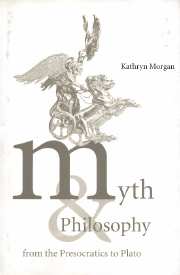Book contents
- Frontmatter
- Contents
- Acknowledgements
- 1 Introduction
- 2 Theoretical issues
- 3 Some Presocratics
- 4 The sophists and their contemporaries
- 5 The Protagoras: Platonic myth in the making
- 6 The range of Platonic myth
- 7 Plato: myth and the soul
- 8 Plato: myth and theory
- 9 Conclusion
- Bibliography
- Index of passages cited
- General index
5 - The Protagoras: Platonic myth in the making
Published online by Cambridge University Press: 22 September 2009
- Frontmatter
- Contents
- Acknowledgements
- 1 Introduction
- 2 Theoretical issues
- 3 Some Presocratics
- 4 The sophists and their contemporaries
- 5 The Protagoras: Platonic myth in the making
- 6 The range of Platonic myth
- 7 Plato: myth and the soul
- 8 Plato: myth and theory
- 9 Conclusion
- Bibliography
- Index of passages cited
- General index
Summary
INTRODUCTION
In the previous chapter we saw how viewing the mythological tradition as a text allowed the sophists to create ironising mythological epideixeis. These epideixeis demonstrated the manipulation of linguistic and social convention through the creation and undermining of rhetorical and ethical paradigms. I suggested that mythological role-playing enabled the sophists to enter into a close relationship with these paradigms. Hippias can play Nestor, Antisthenes can impersonate both Ajax and Odysseus. Epideixeis that concentrate on paradigms for correct ethical behaviour assimilate themselves to, and manipulate, the traditional and societally non-threatening genre of ‘advice to young men’. There was, however, an omission: Protagoras' myth of the origins of civilisation as transmitted in Plato's Protagoras. Because of the complexity of the issues involved, the Protagoras has been reserved for separate treatment. Interpretative problems abound. Are we to believe that the speech Plato puts into Protagoras' mouth represents a Protagorean or a Platonic, myth? If Protagorean, how is it affected embedded in a Platonic context?
In the following pages I shall argue that the myth of the Protagoras is substantially Protagorean and accurately represents a sophistic use of myth with close ties to other sophistic epideictic practice. This demonstration will have two (unequal) parts, both indicative of the role of social and mythological convention. The first concerns the use of myth to disguise the unexamined nature of conventional belief in the prerequisites for a just society.
- Type
- Chapter
- Information
- Myth and Philosophy from the Presocratics to Plato , pp. 132 - 154Publisher: Cambridge University PressPrint publication year: 2000
- 1
- Cited by



